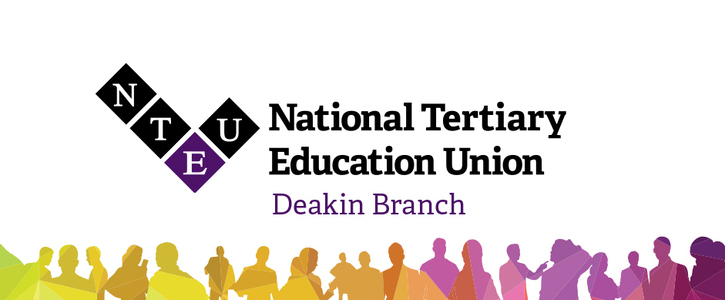100 signatures reached
To: Professor Iain Martin, Deakin University Vice-Chancellor
Open Letter to: Deakin University Vice-Chancellor, Professor Iain Martin

Open Letter to: Deakin University Vice-Chancellor – Casual staff's access to Deakin IT, email and library
We, the undersigned, are academic, research, and professional staff from across all Faculties, Divisions and campuses of Deakin University, and supporters. Further to the National Tertiary Education Union (NTEU) Deakin Branch’s letters of 16 September and 7 December 2020, we write to you again requesting that staff including casuals not be disconnected from the Deakin system, email, Cloud and library due to the reduction of the period of time that staff records are active on HR systems.
The majority of university teaching, student support and research assistance at Deakin is carried out by casual employees who are integral and critical to the efficient performance of the University, with many having already worked for Deakin over the course of many years and will continue to do so. As university teachers and support persons, casuals represent and maintain the reputation of the university, as it is casuals who interact with students in the classroom and in providing support services every day. As such, they need to be treated as the valuable, integral members of the university that they are, rather than discarded and treated in this contemptuous manner.
We note that while the University in its responses to the NTEU – which represents all Deakin staff – has cited the cyber security audit as the justification for ceasing staff access, this audit has not been made available to the NTEU and HR has not implemented measures for maintaining continuity of access whilst meeting audit requirements. In addition to being subject to cyber security regulations, the Higher Education environment in which Deakin operates is also regulated by the Tertiary Education Quality and Standards Agency (TEQSA). Under the TEQSA standards, Deakin is required to ensure that Deakin’s casual workforce maintain their qualifications and professional and disciplinary currency. Maintaining such currency requires continuity of access to the Deakin library, email and communication systems. By removing casual staff’s access, and thereby restricting their ability to continue their professional learning and keep up to date with recent developments in their discipline, the University may be placing casual employees and the Deakin community at risk of failing to meet its obligations under the TEQSA standards, which may also negatively impact the student experience.
Continued access to email and IT enables casual staff to maintain professional relationships with colleagues, including but not limited to ongoing staff who supervise casuals. This aligns with the University’s own policy of requiring that staff communicate with their supervisors and other staff, within their schools and outside the University, solely via their Deakin staff email, which is undermined by the deactivation of staff accounts. Deactivated staff accounts do not produce bounceback emails, and this has resulted in instances where staff members have missed out on re-engagement, publication and other professional opportunities as colleagues at Deakin and beyond who are trying to reach affected staff remain unaware that those staff no longer have access to their email accounts.
It is also vital to note that many casual academics are research active and we would like to remind the University that this labour, undertaken without pay, often profits the University. Failure to take steps to ensure that staff remain connected to the library, email and IT will likely result in research active casual staff choosing not to attribute papers to the University or to deposit their publications into Deakin’s research repository, DRO.
We, the undersigned, therefore urge the University to:
1. Immediately make the external cyber security audit available to the NTEU and
2. Ensure that HR immediately instigates a way to maintain continuity of access whilst keeping in line with audit requirements, and provide a report to the NTEU regarding this.
We, the undersigned, are academic, research, and professional staff from across all Faculties, Divisions and campuses of Deakin University, and supporters. Further to the National Tertiary Education Union (NTEU) Deakin Branch’s letters of 16 September and 7 December 2020, we write to you again requesting that staff including casuals not be disconnected from the Deakin system, email, Cloud and library due to the reduction of the period of time that staff records are active on HR systems.
The majority of university teaching, student support and research assistance at Deakin is carried out by casual employees who are integral and critical to the efficient performance of the University, with many having already worked for Deakin over the course of many years and will continue to do so. As university teachers and support persons, casuals represent and maintain the reputation of the university, as it is casuals who interact with students in the classroom and in providing support services every day. As such, they need to be treated as the valuable, integral members of the university that they are, rather than discarded and treated in this contemptuous manner.
We note that while the University in its responses to the NTEU – which represents all Deakin staff – has cited the cyber security audit as the justification for ceasing staff access, this audit has not been made available to the NTEU and HR has not implemented measures for maintaining continuity of access whilst meeting audit requirements. In addition to being subject to cyber security regulations, the Higher Education environment in which Deakin operates is also regulated by the Tertiary Education Quality and Standards Agency (TEQSA). Under the TEQSA standards, Deakin is required to ensure that Deakin’s casual workforce maintain their qualifications and professional and disciplinary currency. Maintaining such currency requires continuity of access to the Deakin library, email and communication systems. By removing casual staff’s access, and thereby restricting their ability to continue their professional learning and keep up to date with recent developments in their discipline, the University may be placing casual employees and the Deakin community at risk of failing to meet its obligations under the TEQSA standards, which may also negatively impact the student experience.
Continued access to email and IT enables casual staff to maintain professional relationships with colleagues, including but not limited to ongoing staff who supervise casuals. This aligns with the University’s own policy of requiring that staff communicate with their supervisors and other staff, within their schools and outside the University, solely via their Deakin staff email, which is undermined by the deactivation of staff accounts. Deactivated staff accounts do not produce bounceback emails, and this has resulted in instances where staff members have missed out on re-engagement, publication and other professional opportunities as colleagues at Deakin and beyond who are trying to reach affected staff remain unaware that those staff no longer have access to their email accounts.
It is also vital to note that many casual academics are research active and we would like to remind the University that this labour, undertaken without pay, often profits the University. Failure to take steps to ensure that staff remain connected to the library, email and IT will likely result in research active casual staff choosing not to attribute papers to the University or to deposit their publications into Deakin’s research repository, DRO.
We, the undersigned, therefore urge the University to:
1. Immediately make the external cyber security audit available to the NTEU and
2. Ensure that HR immediately instigates a way to maintain continuity of access whilst keeping in line with audit requirements, and provide a report to the NTEU regarding this.
Why is this important?
As university teachers and support persons, casuals represent and maintain the reputation of the university, as it is casuals who interact with students in the classroom and in providing support services every day.


